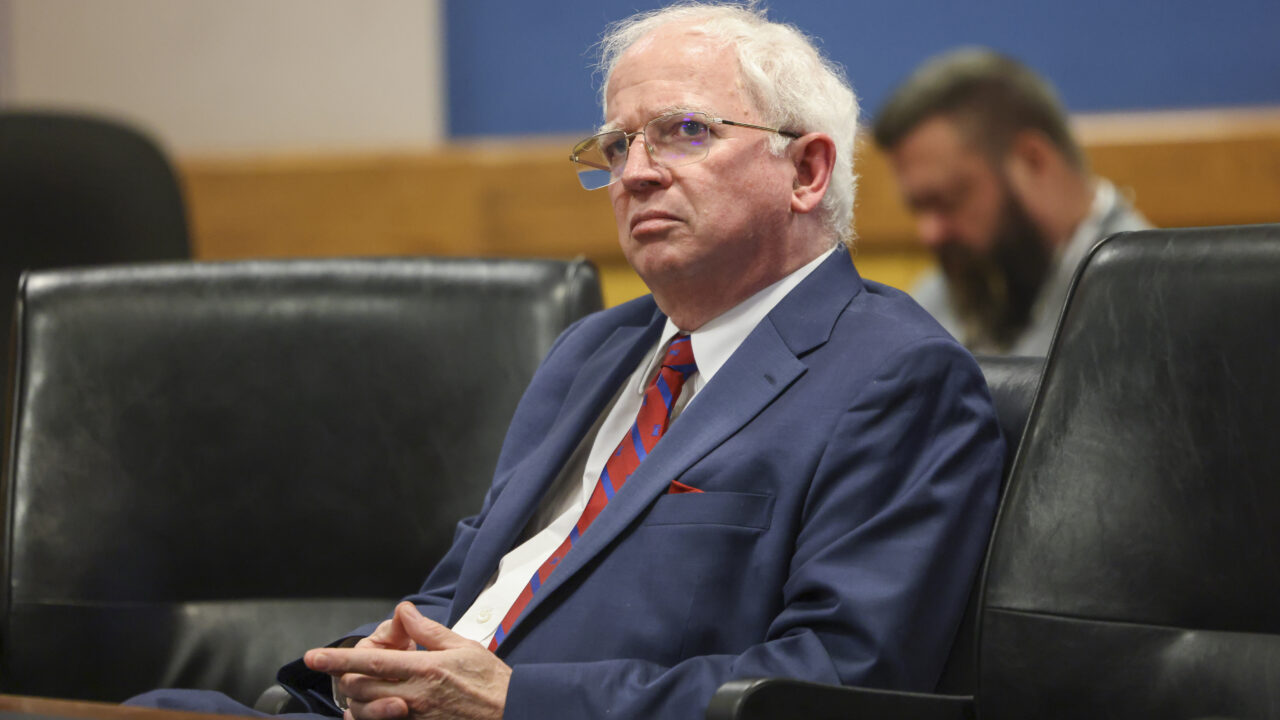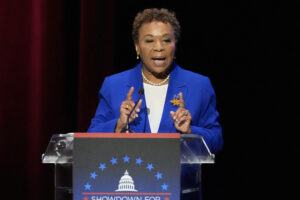Trump’s Insurrection Architect Is Close to Disbarment
After a review of his actions, John Eastman got placed on "involuntary inactive status" in California. Defendant John Eastman listens during a hearing on the Georgia election interference case, Friday, Jan, 19, 2024, in Atlanta. (Jason Getz/Atlanta Journal-Constitution via AP, Pool)
Defendant John Eastman listens during a hearing on the Georgia election interference case, Friday, Jan, 19, 2024, in Atlanta. (Jason Getz/Atlanta Journal-Constitution via AP, Pool)
Donald Trump could not have caused as much damage to the United States as he did had it not been for his coterie of unethical lawyers. While Trump deploys his usual strategy of delay, deny and obstruct to avoid trial on 88 criminal charges, many on his legal team are facing the consequences of their dishonest behavior.
Rudy Giuliani is in bankruptcy and has been suspended from practicing law. Sidney Powell, Kenneth Chesebro and Jenna Ellis have all pleaded guilty to criminal charges in Georgia and could lose their law licenses. Stefanie Lambert recently spent a night in jail for failing to show up for a case against her in Michigan. Lawrence Joseph, Julia Haller and Brandon Johnson, who worked on frivolous court cases alleging election fraud, are all facing disciplinary charges in Washington, D.C. Jeffrey Clark, the former Trump official who tried to enlist the Department of Justice to advance false claims of election fraud, is currently defending himself against an ethics complaint filed at the D.C. Court of Appeals and also faces criminal charges in Georgia.
But it’s John Eastman, the chief architect of Trump’s groundless effort to halt Congress’s certification of the 2020 results of the presidential election, who may be the first to be disbarred, as a result of a recommendation issued last week by the California State Bar Court, which decides disciplinary matters for attorneys licensed in the state.
The proceedings demonstrate that the American system of laws is not powerless in the face of a concerted effort to distort and corrupt that system.
Eastman, who is also a co-defendant in the Georgia racketeering conspiracy case, suffered a major setback in March when Judge Yvette D. Roland determined that he violated “ethical limits by advocating, participating in and pursuing a strategy to challenge the results of the 2020 presidential election that lacked evidentiary or legal support.” The court also recommended fines of up to $10,000, and placed Eastman on “involuntary inactive status,” thereby immediately suspending him from practicing law. Eastman can challenge the ruling before the State Bar Court’s Review Department and can also appeal to the California and U.S. Supreme Courts.
The proceedings demonstrate that the American system of laws is not powerless in the face of a concerted effort to distort and corrupt that system. It could also set a precedent in the other disbarment cases and even in Trump’s criminal prosecutions.
Multiple Ethical Violations
Roland’s scathing 128-page opinion following the 34-day trial finds Eastman culpable for failing to support the Constitution and the laws of the United States, seeking to mislead the courts, and making various misrepresentations. Her 75-page factual summary detailing how Trump, Eastman and others conspired to overturn the 2020 election is a concise and masterful account of the byzantine steps they took to block the lawful certification of Biden’s victory.
Roland quickly disposed of Eastman’s First Amendment defense. Though acknowledging freedom of expression of all citizens, including lawyers, she wrote that since “attorneys occupy a special status and perform an essential function in the administration of justice” and “the State’s interest to protect the public, maintain the highest professional standards by attorneys, and preserve public confidence in the legal system, outweighs any potential free speech rights attorneys may assert in making false and misleading statements.” She cited the long held principle that “speech otherwise entitled to full constitutional protection may nonetheless be sanctioned if it obstructs or prejudices the administration of justice.”
Roland found that Eastman had made multiple false and misleading statements in his professional capacity.
Separately, Roland pointed out that the protections of the First Amendment are not absolute; for example, false statements made knowingly or with reckless disregard of the truth are not protected. Did the attorney have a reasonable factual basis for making the statements, considering their nature and the context in which they were made, and did the attorney pursue readily available avenues of investigation?
Here, Roland found that Eastman had made multiple false and misleading statements in his professional capacity, as well as in public remarks, and knew when he made them that they were false or made them without any reasonable factual or legal basis.
Roland also found that Eastman had willfully violated his duty as an attorney “never to seek to mislead a judge or any judicial officer by an artifice or false statement of fact or law.” But in the case of Texas v. Pennsylvania beforethe U.S. Supreme Court, Roland noted, Eastman failed “to acknowledge the federal court cases that had already considered and rejected” allegations he made regarding voting irregularities and knowingly adopted false and misleading factual allegations. Roland relied on established law, which provides that “concealment of a material fact misleads a judge just as effectively as a false statement,” and there is no distinction among concealment, half-truth, and false statement of fact.”
In a separate count, Roland found that Eastman had committed several acts involving “dishonesty, moral turpitude, or corruption,” for drafting a two-page memo dated Dec. 23, 2020, which falsely stated that seven states “have transmitted dual slates of electors to the President of the Senate.” She found that Eastman’s “dual slates of electors” statement was false and misleading because he knew the Trump electors lacked certification and could not be legally considered on Jan. 6, 2021.
Moreover, even though “Eastman was aware that Vice President Pence lacked the authority to decide which slate of electors would be counted because his sole responsibility was simply to open the ballots,” he “used the false assertion concerning dual slates of electors to provide an alternative strategy” for Pence to declare Trump the winner.
Here and throughout, Eastman argued that he could not be found culpable of moral turpitude because his statements amounted to no more than “zealous advocacy” in his representation of Trump’s interests. Roland held that Eastman’s “inaccurate assertions were lies that cannot be justified as zealous advocacy” and that he “failed to uphold his primary duty of honesty.”
In another count, Roland found that Eastman had willfully sought to mislead a federal court in Georgia by making statements that he knew to be false because he was aware that the declarations of the two purported experts on which he was relying contained inaccurate and unreliable data.
In addition, Roland found to be false and misleading Eastman’s statement in Trump v. Kemp that “Fulton County election officials ‘remove[d] suitcases of ballots from under a table where they had been hidden, and processed those ballots without open viewing by the public in violation of [state law].’” An investigation had already revealed that there were no such ballots, and Eastman acknowledged that he did not view the entire video of the activities in question. Roland found that “Eastman never actively sought out information that might challenge his narrative nor considered any available accurate information.”
Roland easily rejected Eastman’s cowardly argument that he was not culpable because he was simply relying on lead counsel and qualified experts.
Eastman’s falsehoods weren’t limited to court filings. Roland found that he had willfully or with gross negligence fostered doubt about the legitimacy of the election results in stating on Steve Bannon’s War Room radio program that absentee ballot fraud had been sufficient ”to have affected the outcome of the election.” The “inaccuracies could have been identified,” Roland wrote, but Eastman “made no inquiries into the…information he received, which served as the foundation for his erroneous statements” but “simply accepted it as valid,” and once courts determined that the election was legitimate, he kept claiming otherwise.
Eastman’s false statements regarding absentee voter fraud were significant and material, Roland found. He cited uncertainties in urging Bannon’s audience to pressure legislators to invalidate Biden’s victory — “uncertainties that he assisted with creating.” That showed “a disregard for the truth and a willingness to mislead the public.”
Roland easily rejected Eastman’s cowardly argument that he was not culpable because he was simply relying on lead counsel and qualified experts. Every attorney, she reminded Eastman, “bears an individual responsibility for their actions to ensure compliance with ethical obligations.” Relying “on the work of others, even attorneys, does not exempt a lawyer from discipline for a breach of ethics.” Eastman had a responsibility “to uphold his professional duties” and adhere to his “ethical commitments,” and not blame his misconduct on others.
Lying to advance a crime is not okay
In the final count that Roland addresses, she found that the evidence “clearly and convincingly proves” that “Eastman conspired with President Trump to obstruct a lawful function of the government of the United States by conspiring to disrupt the electoral count on January 6, 2021.”
The First Amendment does not protect speech that is employed as a tool in the commission of a crime. The Supreme Court held in 2008, in an opinion by Justice Antonin Scalia, that “[m]any long established criminal proscriptions — such as laws against conspiracy, incitement, and solicitation — criminalize speech (commercial or not) that is intended to induce or commence illegal activities.”
Eastman was charged with conduct and statements made in furtherance of a criminal scheme — trying to overturn the legitimate results of the election. Roland, based on well-settled law and the facts in this case, confirmed that “Attorneys do not have a constitutional right to collaborate with clients for purposes that are unlawful, criminal, or fraudulent.”
In the end, the attorneys representing the State Bar of California successfully proved 10 of 11 counts they had charged.
The First Amendment does not protect speech that is employed as a tool in the commission of a crime.
Given the serious and extensive nature of Eastman’s unethical actions, Roland determined that “the most severe available professional sanction is warranted to protect the public and preserve the public confidence in the legal system.” Eastman’s “lack of remorse and accountability presents a significant risk that Eastman may engage in further unethical conduct, compounding the threat to the public.”
The straightforward principles Roland laid out in her ruling ought to be applied not only to the lawyers but to everyone in Trump’s administration and the Republican Party who did Trump’s bidding in seeking to overturn the results of the 2020 election. Each of those enablers had a responsibility to uphold their own professional responsibilities, whether they be codified in law or canons of ethics, or simply in the fundamental moral standards we expect all members of American society to follow. Roland’s solid legal reasoning and detailed factual findings — especially her rejection of the claim that criminal conduct is protected by the First Amendment — could prove highly persuasive not only in the disciplinary cases pending against Trump’s other lawyers but in the criminal prosecutions against Trump and his co-conspirators.
The painstaking process to prevent John Eastman from ever practicing law again and to hold him accountable for despoiling his solemn oath as an attorney to uphold the rule of law is only one example of a panorama of American institutions fighting back to defend our democracy. Trump, Eastman and all their co-conspirators assaulted the foundations of our system of self-government. It will take the concerted efforts of all of us to repair and strengthen those foundations.
Your support matters…Independent journalism is under threat and overshadowed by heavily funded mainstream media.
You can help level the playing field. Become a member.
Your tax-deductible contribution keeps us digging beneath the headlines to give you thought-provoking, investigative reporting and analysis that unearths what's really happening- without compromise.
Give today to support our courageous, independent journalists.






You need to be a supporter to comment.
There are currently no responses to this article.
Be the first to respond.